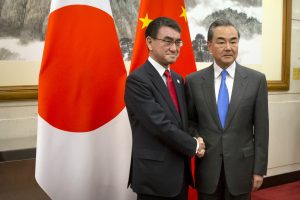On November 15, a history professor from Hokkaido University was released in China after having been detained for over two months. The event was reported by numerous Japanese media outlets. However, the news sparked growing concerns about future exchange between Japan and China, underscoring again differing values and approaches to public order.
At issue is a statement made on the 15th by a Chinese Foreign Ministry spokesperson, who asserted that on September 8, the Ministry of State Security in China had seized materials related to China’s national secrets collected by the professor at a hotel where he was staying. Under questioning, the professor apparently admitted to illegally collecting a large volume of classified information in the past as well. It has been alleged that the professor was in violation of the Criminal Law of the People’s Republic of China and the Counter-espionage Law of the People’s Republic of China.
There are two problems with this. First, the professor was visiting China at the invitation of the Institute of Modern History, Chinese Academy of Social Sciences, and stayed at a hotel arranged by the Institute. When he entered the hotel room, the Ministry of State Security raided the room and seized the “evidence.” The question is, how did they know that the professor had something in his possession? The raid must have been planned following a tip-off or prior investigation. Second, does the material really violate China’s national secrets? The professor is renowned for his scholarship on the history of the Second Sino-Japanese War and for his painstaking approach to the collection of empirical historical data. He collects historical documents around the world, including Taiwan and the United States. If the Ministry of State Security judges that such historical documents fall within the category of “national secrets” and are therefore restricted, without any clear criteria, this is a major problem for researchers.
The spokesperson announced that since the professor admitted to his illegal activities, expressed repentance, and was ready to accept punishment, he was admonished by the Ministry of State Security, placed on bail, and effectively released. The circumstances that led up his release were the communication of concerns at the prime ministerial level to top-ranking Chinese government officials at summits of the two countries, as well as the many objections and concerns raised in Japan. Japan’s leaders took action partly in response to domestic public opinion but also in response to a strong appeal made by the professor’s close relatives. As a result, the professor’s effective release came two months after his detention.
However, anxieties persist not only among Japanese academia but also among the general public. First, around the time of the professor’s release, “facts” that were hitherto unknown began to be revealed. For example, it became known that a Chinese scholar of international politics teaching at Hokkaido University had been out of contact for several months after visiting China. Some universities have begun to collect data on pressures that have been exerted on researchers in China, such as shadowing and monitoring, and moves are afoot to use that data as a reference for those visiting China in the future. From the perspective of individual researchers, it is not a question of whether or not any criminal activity was carried out in China at the time. Rather, what worries them is the possibility that prior investigations into a person’s conduct were carried out, and the person was then ambushed, as well as the fact that what constitutes national secrets is highly obscure, causing many people to feel that they must refrain from traveling to China for the time being. These concerns are particularly notable in the case of China researchers who are collecting materials related to China.
A similar situation applies to intellectuals in China. That is to say, daily educational and research activities are monitored and if any problems arise, the authorities issue them with a warning, which in some cases leads to detention and arrest. This means that the actions taken against Chinese people in China also apply to foreigners who have entered China and Chinese people who conduct research activities overseas. And this situation is not limited to university teachers and researchers: journalists, NGO personnel, government officials, and businessmen face similar concerns.
China positions itself in the international economy as a champion of a “free and open” global and economic trade order. While China’s definition of “free and open” is different from that of the West, ostensibly at least it is not hostile to the existing order. However, in terms of international politics, that is not the case. Although China is not hostile to the United Nations, it clearly criticizes the U.S.-centric security network, as well as Western values, including academic freedom, and freedom of speech and thought. In these respects, there is a very real divide between China and the West. Until now, China has not applied domestic standards intact to foreign visitors. That has now changed. Western countries protect the human rights of visiting Chinese researchers. However, while both China and the West have their own domestic laws, the domestic laws and systems are highly asymmetric. The effect that this has is “sharp power.” This latest incident involving a university professor was an opportunity for Japanese society to experience very strongly the sharp power of China. If Beijing does not deal with this issue, this latest case is bound to have repercussions for efforts to improve Japan-China relations.
Shin Kawashima is a professor at the University of Tokyo.
































